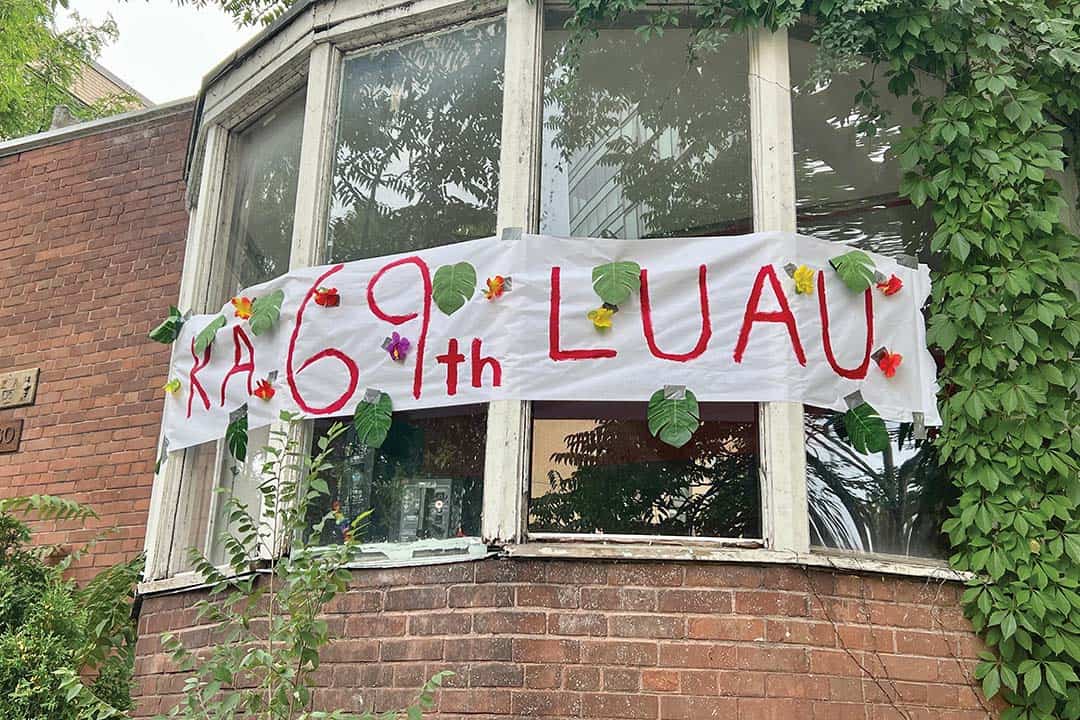Content warning: this article contains mentions of cultural appropriation, racist imagery, and violence against Indigenous women, girls, and LGBTQ+ people.
The Kappa Alpha Literary Society (KA), a fraternity with a chapter for U of T students, hosted its annual lūʻau event on September 9, 2022. Previously described as the “perennially-named” 69th luau, Facebook event pages for the Kappa Alpha Society’s “lūʻau” can be traced back to 2015. The event encourages students to “join the world’s oldest Greek Letter society for a celebration of Hawai’i and its culture.” The $10 entrance fee for the 2015 event included “Hawaiian beverages, beer, lei, DJs, and much more!”
On September 10, Uahikea Maile, professor of Indigenous Politics, criticized KA for its “69th luau” on Twitter.
Maile wrote, “Hawaiian culture is appropriated & hypersexualized globally. Calling your frat party a lūʻau is one thing. Calling it the 69th annual is another.”
Maile’s first experience with the KA lūʻau was during their “first week on campus” in 2019 after relocating to Toronto from Maunawili, Oʻahu, and seeing an advertisement for the 69th luau. “Every year is the 69th Annual Luau. This year was no different,” Maile wrote in an email to The Varsity.
Canada’s connection
Maile said that the advertisement they saw for the party in 2019 was “more shocking,” as it “included a hand-drawn or painted brown-skinned woman with slanted eyes smiling in a coconut bra and grass skirt.” They believe that “it’s one thing to appropriate Hawaiian culture, and it’s another thing to perpetuate the hypersexualization of Indigenous women in Hawai’i.”
“This is a fraternity on campus perpetuating a dangerous trope about Indigenous women in the midst of an ongoing genocide against Indigenous women, girls, and 2SLGBTQ+ folks across Canada.”
“This is how sexual violence and colonialism are entwined,” they wrote.
Maggie Cummings, an associate professor at UTSC’s Department of Anthropology, wrote in a statement to The Varsity that she agrees with Maile’s comments about KA’s “69th Luau.” “Naming one ritual celebration (a frat party) after a ritual celebration from an entirely different cultural tradition (the Hawaiian lūʻau) is a form of cultural appropriation,” she wrote. Cummings critiqued the concept, explaining that Hawaiian lūʻau-themed parties are so “commonplace” that individuals hosting these parties can easily buy all of their supplies at the dollar store.
Moreover, Cummings echoed Maile’s concerns about how KA’s “69th Luau” perpetuates “a long and detrimental history of hypersexualization of Hawaiians and Pacific Islanders.” Additionally, she noted that, following the National Inquiry into Missing and Murdered Indigenous Women and Girls, one of the Calls to Justice is to “breakdown these types of hypersexualizing images.”
She wrote, “It is probably the case that many students don’t know what a traditional lūʻau is, or stop to wonder what happens when those of us who aren’t Indigenous Hawaiians unthinkingly associate grass skirts, coconut bras and tiki torches with exoticness, sexiness, or even romance.”
Gaining insight into Hawaiian culture
Second-year political science student Gabe Foresta had a friend invite him to the lūʻau. He explained that there were at least 200 people at the party.
“The nice thing about being part of a university is that we are all here, hopefully, to learn,” Cummings wrote to The Varsity. She added that there are resources available for students to explore, including University of Hawaii at Manoa’s open access Teaching Oceania series. The series focuses on topics including gender, militarism, and Oceanic arts.
“[After reading this] I think a little differently about bikinis, or the hula as [a] sexy tourist performance, or the lūʻau,” she concluded.
U of T’s response
A U of T spokesperson wrote in an email to The Varsity that “[U of T] has no affiliation with fraternities and sororities. These organizations are independent and self-governing.”
“The University is strongly committed to upholding the principles of equity, diversity and inclusion.” The spokesperson explained that any students, staff, faculty, or librarians can contact the Institutional Equity Office “for consultations or to share concerns.”
The Toronto Kappa Alpha chapter isn’t the only fraternity that hosted a luau as a welcome back event. The Kappa Luau hosted by the Kappa Alpha Psi Fraternity at Mercer University in Georgia also held a luau-themed event back in August.
The Kappa Alpha Society has not responded to The Varsity’s request for comment.
Editor’s Note (October 4, 2022): A previous version of this article referred to the Toronto branch of the Kappa Alpha Literary Society as “one of U of T’s fraternities,” incorrectly implying that there is a formal connection between the fraternity and the university. The article has been updated to clarify that the fraternity simply has a branch for U of T students.


